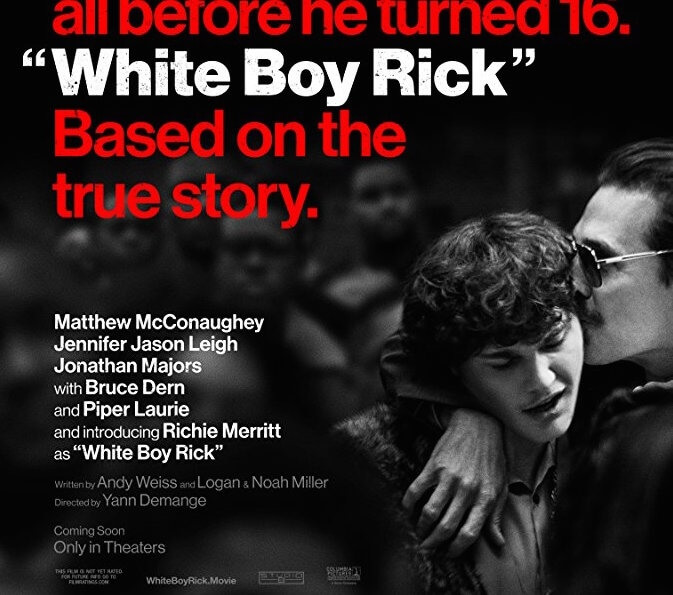With his unruly mop of hair and quizzical expression, teenager Rick Wershe, Jr. (Richie Merritt) resembles a confused, vaguely aggrieved English sheepdog—dangerous if cornered, perhaps, but fundamentally lovable. That’s very much by design, since White Boy Rick, a (mostly) fact-based crime drama, wants audiences to perceive Wershe as a man who’s been deeply wronged, having unjustly spent the past three decades languishing in prison. The movie’s not wrong, exactly: What happened to Wershe is, indeed, unconscionable, and he should have been released long ago. But White Boy Rick treats its subject as a singular case, when the error of judgment that’s truly kept him locked up is utterly commonplace, affecting thousands of prisoners whose stories aren’t as superficially sensational.
Set in Detroit between 1984 and 1987, the film opens with a 15-year-old Rick assisting his father, Richard Wershe Sr. (Matthew McConaughey) with the old man’s at best semi-legal gun-dealing business, operated primarily out of a car trunk. After selling a couple of knockoff AK-47s to a group of local drug dealers (led by rapper YG as Leo “Big Man” Curry), Rick winds up targeted by a pair of FBI agents (Jennifer Jason Leigh and Rory Cochrane—yes, it’s Wooderson and Slater, together again at last!), who threaten to jail dear old dad unless Rick helps them out by making controlled buys from crack houses. Incredibly, this arrangement evolves into the feds actively encouraging “White Boy Rick,” as Big Man’s crew quickly dubs him, to start dealing on his own, ostensibly for the purpose of making him appear more legit. As one might imagine, this goes less than swimmingly, with Rick first getting shot and later being arrested. Caught with a whopping eight kilos of cocaine, he’s handed a mandatory life sentence, and is still behind bars today.
Well, sort of. Wershe was finally paroled on his original Michigan drug charge last year; he’s now serving time in Florida for a completely different crime committed while he was in jail. It’s a complicated matter (Wershe claims he pled guilty only to prevent relatives from being charged), but the film opts not to address it at all, preferring to garner surefire viewer sympathy. What’s more, White Boy Rick clearly means for viewers to feel outrage over what amounts to a form of entrapment—after all, as Rick’s dad angrily points out, it was the government that made this kid a drug dealer in the first place. Insane and unjustifiable though that was, however, the feds cut Rick loose as an informant years before his arrest. He returned to dealing of his own volition, simply because he was tired of being broke. The true injustice in Wershe’s case involves mandatory-minimum sentencing for nonviolent crimes, but that makes for a considerably less sexy marketing hook.
Meanwhile, White Boy Rick’s three credited screenwriters have to generate moment-to-moment interest in Wershe’s life, which is of interest primarily due to the prison sentence he received. For what’s essentially the tale of an undercover operative who gets sucked into the life, this film is oddly devoid of tension—especially given that it’s directed by Yann Demange, whose debut feature, the Belfast-set ’71, was almost entirely an exercise in sustained, heightened anxiety. Nor is there much emphasis on Detroit in the 1980s, apart from one memorable roller-skating sequence. It’s left to the first-rate cast—which also includes legends Bruce Dern and Piper Laurie as Rick’s cantankerous grandparents—to provide some flavor. Best of all is Merritt, a remarkable find who makes an indelible impression in his very first onscreen role. Giving Rick just the right mix of bravado and awkwardness, he’s like an improbable gene splice of a young Matt Dillon with a young Seth Rogen. Don’t expect him to disappear for 30 years.


 Keep scrolling for more great stories from A.V. Club.
Keep scrolling for more great stories from A.V. Club.